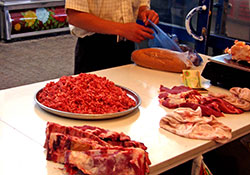Antimicrobial resistance (AMR) from a food safety perspective

WHO
Antimicrobial agents (antibiotics) are essential drugs for treatment of infectious diseases, both for humans and animals. Antimicrobial resistance (AMR) is the development and spread of resistance to these agents following their use and misuse. WHO/Europe organizes training workshops to strengthen European countries’ capacities to tackle AMR from a food safety perspective.
Resistance to antibiotics is also a food safety problem
Antibiotics are used in food animals not only for treatment, but also for disease prevention and growth promotion. WHO and other international bodies have recognized that antimicrobial use in animals contributes to resistance problems in human health. Foodborne infections caused by resistant bacteria, such as Salmonella and Campylobacter spp., pose a particular risk to human beings because of possible treatment failure. Resistant commensal bacteria, such as Escherichia coli and Enterococcus spp., also pose a risk, as they can carry resistance genes that can be further transferred to human pathogens.
Tackling AMR from a food safety perspective
Preventing and controlling antibiotic resistance is a complex issue which involves many different sectors and requires a comprehensive approach and international cooperation. Animal producers, veterinarians and veterinary/food safety authorities, together with other stakeholders, have a key role in preserving the power of antibiotics at the origin of the food chain by:
- preventing development and spread of antibiotic resistance through prudent use of antibiotics in food animals; and
- reducing the need for antibiotics by preventing and controlling infections through for example improved hygiene and infection control.



